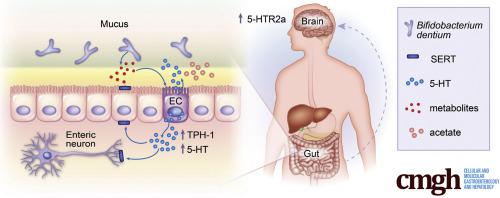Cellular and Molecular Gastroenterology and Hepatology ( IF 7.2 ) Pub Date : 2020-08-12 , DOI: 10.1016/j.jcmgh.2020.08.002 Melinda A Engevik 1 , Berkley Luck 1 , Chonnikant Visuthranukul 2 , Faith D Ihekweazu 3 , Amy C Engevik 4 , Zhongcheng Shi 1 , Heather A Danhof 5 , Alexandra L Chang-Graham 5 , Anne Hall 6 , Bradley T Endres 7 , Sigmund J Haidacher 1 , Thomas D Horvath 1 , Anthony M Haag 1 , Sridevi Devaraj 1 , Kevin W Garey 7 , Robert A Britton 5 , Joseph M Hyser 5 , Noah F Shroyer 8 , James Versalovic 1

|
Background & Aims
The human gut microbiota can regulate production of serotonin (5-hydroxytryptamine [5-HT]) from enterochromaffin cells. However, the mechanisms underlying microbial-induced serotonin signaling are not well understood.
Methods
Adult germ-free mice were treated with sterile media, live Bifidobacterium dentium, heat-killed B dentium, or live Bacteroides ovatus. Mouse and human enteroids were used to assess the effects of B dentium metabolites on 5-HT release from enterochromaffin cells. In vitro and in vivo short-chain fatty acids and 5-HT levels were assessed by mass spectrometry. Expression of tryptophan hydroxylase, short-chain fatty acid receptor free fatty acid receptor 2, 5-HT receptors, and the 5-HT re-uptake transporter (serotonin transporter) were assessed by quantitative polymerase chain reaction and immunostaining. RNA in situ hybridization assessed 5-HT–receptor expression in the brain, and 5-HT–receptor–dependent behavior was evaluated using the marble burying test.
Results
B dentium mono-associated mice showed increased fecal acetate. This finding corresponded with increased intestinal 5-HT concentrations and increased expression of 5-HT receptors 2a, 4, and serotonin transporter. These effects were absent in B ovatus-treated mice. Application of acetate and B dentium–secreted products stimulated 5-HT release in mouse and human enteroids. In situ hybridization of brain tissue also showed significantly increased hippocampal expression of 5-HT–receptor 2a in B dentium–treated mice relative to germ-free controls. Functionally, B dentium colonization normalized species-typical repetitive and anxiety-like behaviors previously shown to be linked to 5-HT–receptor 2a.
Conclusions
These data suggest that B dentium, and the bacterial metabolite acetate, are capable of regulating key components of the serotonergic system in multiple host tissues, and are associated with a functional change in adult behavior.
中文翻译:

人源双歧杆菌调节哺乳动物血清素系统和肠脑轴。
背景与目标
人类肠道微生物群可以调节肠嗜铬细胞产生血清素(5-羟色胺 [5-HT])。然而,微生物诱导的血清素信号传导的机制尚不清楚。
方法
用无菌培养基、活的牙双歧杆菌、热灭活的B 牙菌或活的卵形拟杆菌处理成年无菌小鼠。使用小鼠和人类肠类物质来评估B dentium的作用肠嗜铬细胞释放 5-HT 的代谢物。通过质谱法评估体外和体内短链脂肪酸和 5-HT 水平。通过定量聚合酶链反应和免疫染色评估色氨酸羟化酶、短链脂肪酸受体游离脂肪酸受体 2、5-HT 受体和 5-HT 再摄取转运蛋白(血清素转运蛋白)的表达。RNA 原位杂交评估了大脑中 5-HT 受体的表达,并使用大理石埋藏试验评估了 5-HT 受体依赖性行为。
结果
B dentium单基因相关小鼠的粪便醋酸盐增加。这一发现与肠道 5-HT 浓度增加和 5-HT 受体 2a、4 和血清素转运蛋白表达增加一致。这些作用在B ovatus治疗的小鼠中不存在。醋酸盐和B dentium分泌产物的应用刺激了小鼠和人类肠内 5-HT 的释放。脑组织的原位杂交还显示,与无菌对照相比,在B dentium处理的小鼠中,5-HT 受体 2a 的海马表达显着增加。在功能上,B dentium定植使先前显示与 5-HT 受体 2a 相关的物种典型重复和焦虑样行为正常化。
结论
这些数据表明,B dentium和细菌代谢物醋酸盐能够调节多种宿主组织中血清素能系统的关键成分,并与成人行为的功能变化有关。


























 京公网安备 11010802027423号
京公网安备 11010802027423号